If you’ve wandered into this post without knowing who Hodor is, then you probably have not seen much of HBO’s Game of Thrones or read A Game of Thrones, the first novel that the show is based on. That’s cool, all are welcome. But it’d probably be best if you not read this particular post, and instead checked out the show and then came back fully informed. Because I’ll be talking some spoilery details.
Just know that Hodor is a beloved character in a series that has at least one thousand characters. (Many of them not nearly as charming and exemplary as Hodor.) Now, shoo.
Anyone who is still here either knows all about our gentle giant, or is willing to be spoiled.
Fair enough.
Doctor Whodor
This post will definitely be about Hodor, but the main focus is going to be a discussion about time travel, for reasons that should be obvious. (If it’s not obvious, it’s because of Bran Stark’s time-breaking powers…)
Please don’t fret, I know that a lot has already been said or written about time-warging and the usual time travel paradox implications.
I’ll bring up paradoxes and so on in a cursory way, but I have somes angles to explore that I haven’t heard anyone else mention (but I’m pretty sheltered so it’s possible I’m treading over well-trod Reddit territory) and I also want to discuss the effects that time-loops might have on enabling prophecy and how that can be a legit thing in the story. (I’m usually not a fan of prophecy.)
I’ll try to be whimsical and/or entertaining. At the very least you can smugly make fun of the crude Powerpoint diagrams that I created, with which I’ll be trying to illustrate my points.
Let’s start.
“The past is already written. The ink is dry.”
In Season Six of Game of Thrones, young Bran Stark received pseudo-scientific instruction from a character referred to as The Three Eyed Raven (because Old Guy Sitting In Tree Roots just didn’t have the same zing.) Much of Bran’s schooling focused on looking back into Westeros’ past.
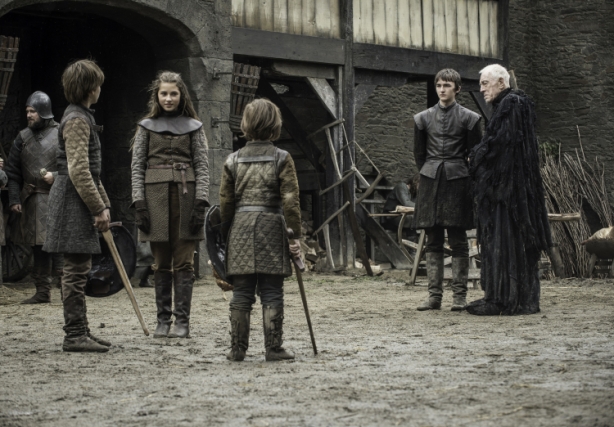
Three-Eyed Raven: Behold! Your father, aunt, and uncle when they were in their innocent youth!
Bran: Do you observe children a lot? This is vaguely creepy, bro.
Bran’s training abruptly came to an end when the nefarious Others attacked the Three Eyed Raven’s cave lair. I’m sure everyone remembers the full details, so I’ll just briefly set the stage.
Bran’s companions, Meera Reed and Hodor are aware of the attack by the White Walkers but the Three Eyed Raven had taken Bran’s consciousness off into the past, observing (for some reason) the moment when young Ned Stark’s departed from Winterfell. (Ned was off to begin his fostering with Jon Arryn.) The timing of the White Walker attack while the two wargs were away and helpless was quite concerning to Meera.
Because of this crisis in “present time”, Bran’s consciousness in the past was indirectly directed to create a conduit between present day Hodor and Hodor’s younger version, the enormous stableboy named Wylis. (Hodor isn’t Hodor’s name, remember? And yes, book readers, Hodor’s given name was Walder in the books, we know, we know. Oh oh oh.)
Because of this connection, young Wylis’ consciousness was flooded with older Hodor’s perception. (Right? I guess? We can debate the specifics, but like Robb, Rickon or Sansa, I don’t have a dog in this fight.)
Presumably, young Wylis experienced Hodor’s death while Hodor was “holding the door” so Meera could escape with Bran. Meera’s “Hold the Door (Hodor) Hold the Door (HODOR)” directive became fixed as the sum of young Wylis’ vocabulary. Hodor.
Despite the Three Eyed Raven’s assertion that the past was the past and could not be changed, Bran’s warging action certainly looked like he’d changed the past. Or rather, the past was affected to guide events back onto the path he knew? One where Hodor was a simple soul who could only utter “hodor” instead of being a capable-of-speaking Wylis.
Although there was a certain poetic beauty, a terrible beauty, to how that all occurred, there were some complaints.
- Now that Bran can go back into the past and change things, isn’t it true that nothing on the show matters now? Because Bran can just go back and change things?
- Are we now going to find out that Bran is responsible for everything? Like he went back in time and drove the Mad King mad by trying to tell him “Hey king, don’t go mad!” or something?
- How could Bran even turn Wylis into Hodor from the future? What? Don’t violate my causality, man!
- What would happen if Bran went back and killed Rickard Stark before Ned Stark is born? (This is the classic expression of the Grandfather Paradox. Alternatively, he could bump off Hoster Tully I suppose.)
These are topics that had already been talked about and it’s not really a new thing. Time travel paradoxes are numerous throughout science fiction and fantasy.
Instead, I just want to focus on two explanations or examinations that might resolve the above questions. One of them I disagree with and one of them I agree with (because it’s the one I came up with.)
- Game of Thrones is a deterministic universe where things can only happen in one set way (I’m stealing this from Matt Murdick’s examination of Bran Stark from his excellent podcast Podcast Winterfell.)
- Alternatively, there is more than one timeline, and there exists a viable timeline where Wylis never became Hodor. That timeline contributed to creating the timeline that we know on the show, where Wylis exists as Hodor. (This is my theory; the one I prefer.)
Time to discuss both theories of time. Time squared!
1. There is no fate but what we make. NOPE. It’s all fated to happen and is happening and will happen. Exactly as advertised.
The argument is this: there’s only one possible timeline and all the choices have been already made. The outcome of each action is deterministic. Here’s a handy definition of deterministic:
relating to the philosophical doctrine that all events, including human action, are ultimately determined by causes regarded as external to the will.
If we assume that Wylis and young Ned were roughly the same age (both were children, but Wylis was part giant and therefore huge for his age) we can roughly say that thirty years before the start of the show’s story (give or take some years) the consciousness of Bran Stark (who had not yet been born) and his mentor’s consciousness manifested in some way in the Winterfell courtyard. More than just seeing images of the past, Bran’s consciousness was able to influence events of that past moment so in a sense Bran was actively there. In the past. Before he was born.
This mysteriously-sprung-from-the-quantum-foam Bran managed to create a connection between young stablehand Wylis and Wylis’ older self in the future, the one immutable and predestined future where this grown version was being attacked by wights. Will be attacked by wights. (Look, just go with the vague syntax on action.)
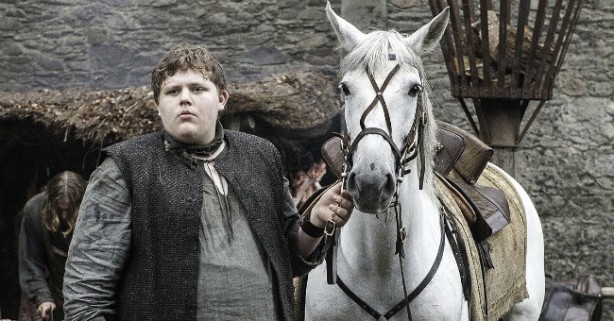
Wylis: I’m like three years old, yet I am forced to labor for the masters.
Horse: Uh, yeah! Welcome to my world, Wylbur.
This experience had a profound effect on the mental state of young Wylis, who suffered with limits on his cognitive capabilities until over the years he would eventually travel north with Bran to the great weirwood’s cave.
This open loop will be closed when Bran wargs back into the past to actually participate in the creation of the Wylis/Hodor connection, and Wylis experiences his future fate as Hodor holding the door.
When talking about time and paradoxes, a condition or event that precedes its cause is called a causal loop.
In normal, non-loopy time, things make sense. When something happens, all the conditions needed for the event to happen, uh, happen before the event.
With causal loops, the effect happens before the cause. And if an effect with no cause preceding it happens, then a cause must occur at a point in the future, with some kind of time travel shenanigans making it happen.
If we embrace this idea that a causal loop is possible, even if it seems logically impossible, it can explains why Bran isn’t changing the past willy-nilly. He didn’t before, so he isn’t now. (Or if he will change the past in other instances that we haven’t yet seen, he’ll do so as a means of ensuring what happened happens.)
So there’s no point in asking what would happen if Bran went back to kill Rickard Stark or Hoster Tully before his parents were born… since they didn’t die before Bran was born, he’s just not going to go commit grand-patricide.
In general the timeline was set already. Wylis becomes Hodor. Eventually Bran acts in the future that guarantees Wylis becomes Hodor, closing the loop. Every event happens because it happened.
Are you happy with that explanation? I’m not really.
Don’t get me wrong. It’s a perfectly valid worldview to explain the events of the story. It has the advantage of modeling exactly what’s happening if we consider that George RR Martin is literally creating the story. He can write in a past effect that depends on the future cause and write the temporal glue that makes it happen.
But I don’t embrace it for philosophical reasons.
2. This has sort of happened before, and it might kind of happen again.
The counter-argument to the above is that there is no causal loop, no asynchronous event without prior cause that turned Wylis into Hodor. Sort of. Okay this is where I get more complicated. And I present even more pictures. Sorry about that.
To appear extra legitimate, this is going to look Math-y. (I’m sure that’s a word.)
Let’s define some terms.
- T is the timeline leading up to when young Ned Stark is leaving Winterfell.
- WW is the warging event moment at Winterfell when Bran is back in time, watching his father’s farewell.
- OA is the attack by the Others at the weirwood cave. Bran’s comatose body is there, with his mind in the past observing time moment WW.
(We’ll end up with those terms subscripted. I’m sorry.)
Since I am assuming causal loops are impossible, timeline T after the inexplicable WW moment that turns Wylis into Hodor is at best hypothetical until I can prove otherwise. I’ll call the timeline after that point TH (the H stands for Hodor, but can also stand for hypothetical.)
The timeline I’d expect to happen in a sane cause-and-effect universe, one where Bran did not fry Wylis’ brain from the future and the large-for-his-age stableboy merely watched young Ned leave for the Eyrie, I’m going to call that timeline TW. (The W stands for Wylis.)
Although Wylis might have had a very different life in TW than he might have had as Hodor in TH , I’m going to suggest that it’s possible for the differences between TW and TH to be very minor in respect to Wylis/Hodor’s effect on the timelines.
Wylis is a stableboy. Although he’s not simple like Hodor, Old Nan (his grandmother? Right?) was shown on the show as insisting that Wylis wasn’t going to be a soldier, he was going to work in the stables and that’s that. Let’s take that as canon for now.
So Ned is fostered in the Eyrie in both timelines. Rhaegar falls for Lyanna in both timelines. Wylis mental faculties would have no bearing on these events. The rebellion happens, Ned becomes Lord of Winterfell.
The Stark children are born. Hodor works in the stables in TH. Wylis works in the stables in TW.
The kingdoms are mismanaged equally in both timelines. Jon Arryn is poisoned in both timelines. King Robert comes to offer Lord Eddard the position of Hand. Both timelines have the king away on a hunt, have Cersei and Jaime enjoying an assignation, and have Bran climbing up the old tower and spying on them.
The Brans in both timelines “fall” from the towers. On Bran’s recovery in TH, Hodor was assigned to carry him around and I don’t see why Wylis in time TW wouldn’t also be available to assist crippled BranW. Wylis might be involved in working with Bran and the special saddle that Tyrion designs for the lad.
Theon captures Winterfell in both timelines. One might argue that the huge Wylis would be able to provide more resistance in TW than simple Hodor could in TH, but I’m sticking to my assertion that Wylis received no martial training and I’ll assume that Theon wouldn’t have had Wylis killed.
Hodor obligingly follows Osha’s lead in protecting the boys in their faux escape, I’d imagine in timeline TW that Wylis would also assist the young lords.
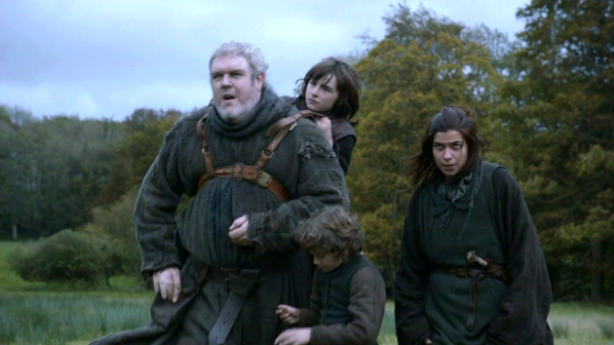
Wylis: Isn’t it a lovely day, my little lords? A perfect day for strolling about. Well, I’ll be strolling, Lord Bran. You’ll be riding along.
Osha: You talk too much.
With Winterfell in ruins (thanks to Bolton treachery) the TW timeline would be just as likely as the TH timeline in having the Stark boys assisted by their half-giant companion in taking them away from the castle, to encounter the Reeds and begin the long trip north to the Wall and then north beyond-the-wall.
In Hodor’s timeline, he went along without commentary or ambition. It’s probable that Wylis might have his own opinions on the matter, but Game of Thrones is filled with smallfolk who follow orders. It seems unusual and unlikely for Wylis to buck the trend.
My assumption is that the Others attack the weirwood redoubt in TW under comparable but probably slightly different circumstances. My theory depends on the Three Eyed Raven having brought Bran on the WW warging trip before the Others show up, not necessarily because he expected the Others. It’s just what they were doing when the White Walkers showed up. And here’s where it all happens.
In general, it’s unclear exactly why the Three Eyed Raven on the show (which corresponds to TH) brought Bran to see the farewell of Ned at Winterfell at that time. The old wizard was supposed to be prepping Bran for the great war against the Others; there seemed to be a ticking clock happening since Bran was marked by the Night’s King.
The Three Eyed Raven:
- Knew that the Others would be coming
- Said that the magical wards on the cave would be insufficient.
So why bring Bran there and just chill out? Especially because the Three Eyed Raven acted like he was hoping for more time to teach Bran. It was as if he knew this was all going to happen but was expecting time for more preparation. The Winterfell warging trip (WW) seems like a waste of that time.
Bran: Uh, why are we here? Is this going to take a long time? I forgot to go to the bathroom before warging.
Three Eyed Raven: Now you tell me. Just hold it a bit longer.
Meera (from the ‘future’): Bran! Warg into Hodor! We need Hodor!
Bran: Uh, what?
Three Eyed Raven: Do as your friend says, Bran.
Bran: Wow, do you sound world weary and resigned to some fate. Even more than usual.
It seems like a waste of time, unless he was taking Bran to that location for a reason. Because he was trying to recreate a moment in time and that he had to keep Bran there on a some kind of schedule.
And then have Bran do something.
I suggest the reason is this: in timeline TW (where Wylis did not become Hodor in his youth) the Others attacked (OAW) when the Three Eyed Raven and Bran had sent their consciousness to the Winterfell farewell of Ned Stark. Young Wylis was in attendance, and he’s unique in that he is the only human non-warg both at the WW moment/location and the OAW location.
We’ve seen that a warging connection can be made through the same person, across two different moments. I can’t fully explain what happened (I can endlessly speculate) but I’m going to suggest that BranW (Bran from timeline TW) either deliberately or accidentally created a warging connection between young Wylis in the WW moment, and older Wylis in the OAW moment.
I’ll further suggest that in TW, Meera was escaping with Bran and to secure the best chance for their safety, that older Wylis chooses to hold the door against the wights. And young Wylis got to experience that trauma. And that this created the TH timeline with which we’re familiar with in the show.
So, Wylis was not originally turned into Hodor by the Bran we know (BranH), but instead most likely by the Bran we don’t know, the Bran from TW (BranW.) Alternatively, I wouldn’t be surprised if Wylis was turned into Hodor originally by Three Eyed RavenW, and the Three Eyed RavenH opted to shuffle the blame onto BranH.
You’re probably tired with all these subscripts, I apologize, but this isn’t the full story. This scenario above explains how we get the timeline we see on the show, TH. The Bran we know, BranH, doesn’t create this timeline. He actually creates a new timeline, let’s call it TH2, or the second Hodor timeline.
In my opinion, there might be so very little difference between TH and TH2, so little difference that it might not even matter trying to distinguish them. (But here’s a complicated diagram if we want to debate this in depth.)
Regardless, we don’t get to see how TH2 plays out. People in TH2 might make the same choices that they did before or they might not. I have an opinion on that, but I’ll get to that later.
What matters is this: we are continuing to follow the story of BranH, who saw that the past can be affected and that in affecting the past there was a bad result which harmed innocent Wylis. This knowledge might discourage Bran from trying to change the past again, but maybe not.
If he tried to change the past again, if we follow my model of how time works in the story, then he won’t be changing his personal timeline nor will he affect the story going forward. Some other TX would be created, but we will always be following what I’m calling TH. (Unless a Tardis shows up. Then all the rules are off the table.)
TOO LONG; DIDN’T READ
I totally understand if you skipped over all that. Here’s a summary.
- The Hodor we know was originally hodorized by a slightly different set of circumstances: I’m assuming that there was a previous timeline where Wylis remained himself and because of warging in that previous timeline, a timeline with Hodor as Bran’s simple servant was forged.
- Bran on the show has created a new timeline, but we aren’t going to see how that plays out. Only the same timeline that we’ve been following.
If you want to argue with me based on the short assertions above, you’ll have to read the full article for me to take your points seriously. Otherwise I will throw subscripts at you like stones from a trebuchet.
Why does this even matter?
Alright, I mentioned in the causal-loop/deterministic universe section that I had philosophical reasons for why I don’t favor that model of time for the Game of Thrones story. It mostly has to do with the idea of predestined fate versus free will.
I prefer to think that free will is present in these stories so I can admire characters who make hard but virtuous decisions and despise characters who make selfish and nefarious decisions. With free will, I can better appreciate the consequences of those choices.
If the universe these characters are moving through is driven entirely by the engine of Fate, then it removes some of the enjoyment of the story (for me, at least) as well as lowers the stakes.
On a tangential note, I’m very interested in what was going on in Hodor’s head-space during OAH when he dies holding the door, and what might have been going on in grownup Wylis’ head-space during OAW, when (in my theoretical construct) he chose to die holding the door.
There is some question from watching the Hold the Door episode if Hodor is exercising free will in keeping the door shut as long as possible, or if he is being warged into place by Bran. In the former situation, Hodor is a big damn hero. In the latter, Bran Stark is a monster.
In the theoretical TW timeline that I have as the heart of my time travel theory, it’s quite possible that Wylis is being forced into this position (maybe by BranW, maybe by Three Eyed RavenW), or that he chose to do so selflessly. These are important points to consider.
Unless the universe is all pre-ordained. Then it matters so much less. Hodor might be a hero, but not if he had no true choice in the matter. Bran might be a monster, but is he *really* if he had no choice in the matter? That even the choices they might have made were predestined and it’s entirely not their fault or to their credit? Feel free to tell me what you think.
I’ll wrap this up by explaining why the time travel implications of my theory make me happy, because it gives me a pleasant rationale for prophecy actually being a legitimate mechanic in the story.
Prophecy: this has happened before…
Last year, I wrote a post about prophecy in Game of Thrones. It was an amazing post, tremendous post. Top notch. (Look, no one else is going to say that, so I might as well.)
One of the points of that post brought up my relative dislike of prophecy in fantasy and science fiction. I make exceptions for situations that are part of large, repetitive cycles. Like the Oracle in the Matrix movies or the occasional prophetic through-lines in Battlestar Galactica, because of the cycle of Human->Cylon->Human repeat apocalypses and recreations.
But in Game of Thrones, there was no obvious cycle at work. A prophecy was theoretically a glimpse into a future that had not yet happened. Where could that information come from?
Most prophecy on the show was vague enough (especially Melisandre’s murky insights) that I could be comfortable discounting it as the result of lucky guesses instead of actual “prophecy”. But Maggie the Frog’s predictions for Cersei were just a bit too specific for me to be all that comfortable.
But Bran warged roughly thirty years into the past and influenced events. It doesn’t matter if it was because of a causal loop or my proposed mechanics of multiple and successive timelines… there’s something like a cycle at work.
The show has demonstrated that people can see into the past; Bran did that throughout the sixth season. If there is a cycle at work, seeing the “future” could really being able to see into the “past”, observing the previous cycle.
It’s not necessarily a pre-ordained predestined future though, or at least it doesn’t have to be. I like free will to be in the stories I consume, and I like to think that people can make choices and alter the flow. Maybe ending the cycle, maybe not. But if one can get a sense of what has happened before, possibly many times before, it’s not that unusual to expect the same thing might happen again. Or thereabouts.
Cersei Lannister was visiting Maggie the Frog as a child. That point of time probably was not all that far off temporally from the moment when Ned was leaving Winterfell. If Bran warged into the past and created a cycle when Wylis became Hodor, then there’s a viable timeline that happened “before.” Maggie seemingly has the perception required to track someone’s destiny, or in my view see what had happened to them “before” in the previous timeline. So I’m much more accepting of prophetic mumbo-jumbo in the story.
But what about much older prophecies? Things that were foretold in the past further back than Bran’s journeying? There was a Prince that was Promised and that’s an old, old story. Many of the Targaryens were said to possess a type of foresight, although it didn’t necessarily turn out as expected. (One should read George RR Martin’s Dunk and Egg stories, particularly The Mystery Knight novella, for some of this Targaryen lore.)
Bran’s time traveling wouldn’t explain those, but Bran isn’t the only warg in the Game of Thrones universe. The current timeline (TH, remember) could have been the continuation from a much older cycle where a warg )possible even further in the future) had affected the past further back and created a bubble of space-time, allowing someone sensitive enough to the passage and repeated passage of events to write down a prophecy. Particularly if the current timeline is nested inside of a much larger cycle. Or some other weird combination.
Nested events of time travel cycles also have the advantage of allowing people to make different decisions, but because there’s a repeat nearly guarantee from a much larger outer cycle, the inner loops are still likely to occur or reoccur.
To sum up, although I’m not usually a fan of time travel I enjoyed the aspect that was brought to Game of Thrones with Bran’s ability to seemingly warg into the past. I don’t think it’s show-breaking, things still have stakes, and I think it assuages any complaints that I might have had about prophecy and fortune-telling being actual elements on the show.
If you have gotten this far, hopefully my thesis wasn’t too awful a read.
Clearly, I spent way too much time thinking about this.
I want to thank Matt Murdick from Podcast Winterfell, not only for his excellent podcast but for his views on the deterministic nature of Game of Thrones. We don’t agree on the specifics of the universe in regards to time, but I think his theory is solid. His analysis of the implications on the show was in part my inspiration for this post.
I’d like to additionally credit the Fire and Lunch podcast which featured a spirited debate among the hosts after the Hold the Door episode, about the implications of time travel on the storyline in Game of Thrones. If there wasn’t all this debate I probably wouldn’t have decided to firm up my own theoretical doctrine for warging back in time.
If you’ve read this post, I’d be delighted to know what you think. Or if you just skimmed through, that’s cool too. It’s pretty easy to make me happy. But I put a lot of work into this and it would be good to know if anyone read it.
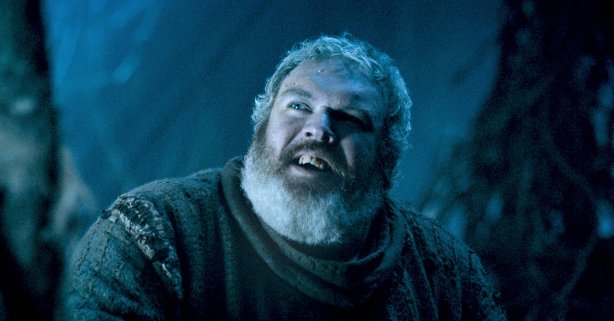
Hodor! (Translation: If faced with the choice of reading this post, or holding the door… I think the door would win out.)
Hodor. Indeed.
(Comments are always welcome. Super welcome! But if you want to talk spoilery Game of Thrones talk with me (also welcome) I’d invite you to visit my Safe Spoilers page on my backup blog. That way my non-book-reading friends won’t be shocked with foreknowledge.)
Most images from HBO’s Game of Thrones (obviously.)
The diagrams were created by me, baby, by me. You’re just lucky I didn’t use some of the things I was planning on using, like a powerpoint Bran, Hodor, and weirwood tree. (If asked, I can add it in the comments, but it’s embarrasingly crude.)
I make no claim to the photographic images, but I do make claims to the diagrams. As usual, I make some claims to the text. So there. Especially this article, since it’s almost like a real theoretical work or something. (Let me have my illusions.)
If you liked this article, thank you! I have all of my Game of Thrones related articles on my handy-dandy Game of Thrones page should you want to read more but don’t want to navigate around my site.
© Patrick Sponaugle 2017 Some Rights Reserved
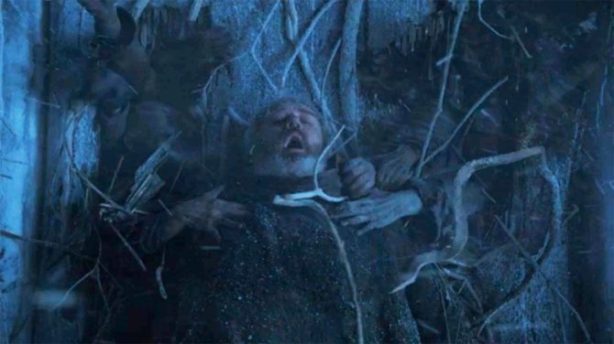


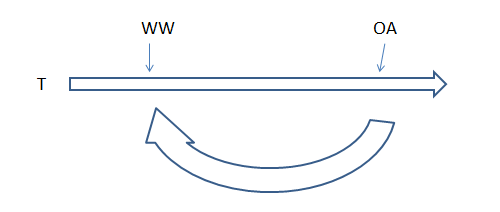
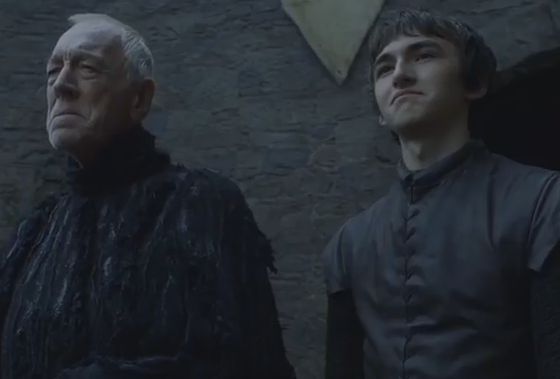


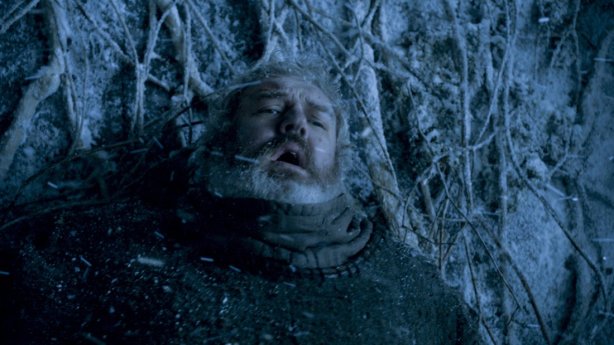

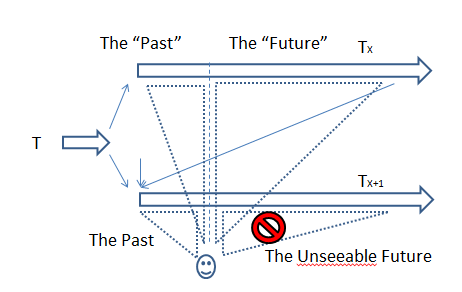

Wow, that was a much denser analysis than I was expecting. My initial thoughts upon watching the show was the causal effect, but your theory has some interesting points. Either way, you create an infinite loop. The only difference is whether that loop is back-and forth or sideways curly-cue.
Either way, I don’t see it being a “story breaking” element. Just because Bran can warg into the past and affect things doesn’t mean he wants to. Nor do we know for sure that he can go back that far or influence events that tangibly without the Three-Eyed Raven’s help.
It kind of ties in with your discussion on free will and prophecy. Just because a person has the choice to do things differently doesn’t mean they will. That’s why, in a way, destiny and free will aren’t mutually exclusive. I have the will to refuse an offer of free ice cream, but there’s likely no timeline in which I would. Therefore, you could say I’m destined to eat it. I think without any significant changes made to the past to drastically alter the timeline, all the characters would make the same choices because they still have the same personalities, morals, and opinions. I don’t see a timeline in which Robert is nice to Cersei, regardless of free will, because being a selfish, drunk womanizer is in his DNA. It comes down to inertia – a character is bound to make the same, inevitable decisions unless a sufficiently strong outside force knocks them off their path.
Hopefully, that makes sense. Too many hypotheticals for one day!
LikeLiked by 1 person
Yeah, it’s either my destiny (or alternatively my inescapable fate) to also not turn down free ice cream.
Thanks for the feedback, I appreciate you reading my inarguably dense article.
LikeLiked by 1 person
Hodor is a big damn hero…That’s all there is to it for me. I cried man tears at his death, and the realisation that his ‘name’ was a long-form writer pun on the (heroic) manner of his death. (Did I mention – hero?) I’ll leave you to your time travel theorising as I continue to blub in the corner… 🙂
LikeLiked by 1 person
I respect your feelings, I felt the same way. Hodor (to me) is a hero in all of the timelines.
LikeLiked by 1 person
Agreed. However many there are!
LikeLiked by 1 person
Hey Patrick, good job attempting the impossible . IMO, the author has to really go wild with it a la Harrison’s Stainless Steel Rat, or really restrict the heck out of it to avoid endless repeat cycles. viz: Terminator. (They can only send 1, he’s naked etc). Make it really, really expensive and dangerous to the continuity. For example, I’m nearing the end of a long project that has a time travel factor and the egregious act of one faction has threatened the existence universe of humans, which is them. Hence, kinda rash.. Anyway, I think your presentation of multiple universes spitting is the only way to go as it avoids the worst of the abuses that a writer can unleash (Ref: Stainless Steel Rat talking to himself…).
LikeLiked by 1 person
Right on, thanks for the feedback!
Time travel can have so many crazy scenarios, like the one you describe of time travelers bumping into each other.
I’m interested in how things will be presented in the upcoming books. People already have theories that it will be a more significant door being held by noble, doomed Hodor.
Good luck on your time travel project, I know those can be tricky
LikeLiked by 1 person
Interesting. Not interesting enough to get me to watch the show, but I like your theories. Time travel is a subject that I’ve always found fascinating.
LikeLiked by 1 person
Thank you for reading it, particularly because you don’t watch Game of Thrones.
I guess in some ways, my talking about Bran Stark being able to influence the past can be generalized to apply to non-Game of Thrones situations.
Thank you again!
LikeLike
I have enough friends and family who do watch it to roughly know what’s going on in the show, so I knew about Hodor before I read this. I like your ideas, they’re well thought out and not too far out there.
LikeLiked by 1 person
Wow. Well-done and intricate analysis that frankly made my head hurt… in a good way.
Time-travel has that effect on me, though. The only way I can break it down is to picture that a time-traveler either 1) STOPS time altogether, then rewinds or fast-forwards or hits “play,” or 2) visits another time that’s simultaneously occurring in another dimension.
And since two specific timelines seem random, then ALL time, past and future, would have to exist. There would be a near-infinite number of parallel universes existing in the same space. The players in each one would only be able to “see” what’s happening in their given timeline.
So, someone who could see the past or prophecy the future would have the power to glimpse other universes/timelines.
In this case, maybe one who foretells is picking up probability echoes–seeing the most likely choice happening in the majority timelines. It’s not wholly deterministic, but the likely scenario of what people of given character are likely to do in certain environments (the starving man will probably eat the food he finds, though he technically could choose not to).
Hodor (great actor who could express so much meaning a single word, btw) would then perhaps be feeling the future echoes of what was bound to be a heroic choice on his part?
The fact that Bran influences the past (is heard) messes up my theory, however. He’s an active player in the timeline. Unless he doesn’t always fall and discover he’s a worg? Maybe we can rationalize this by noting he can’t directly choose where he travels in time or how long he stays there. That would limit how much influence he has on changing the timeline.
Argh- messy stuff. I like your theory more than anything else I’ve heard, at any rate.
LikeLiked by 1 person
I like your parallel dimension theory too, it handles prophecy by having someone looking into a parallel universe that’s ahead in time, as well as where someone messes up the past in a different dimension.
Thanks for reading my long post, I really appreciate it. 🙂
LikeLiked by 1 person
Your logic is brilliant and dizzying. I have a bone on contention that I hope will spark some good discourse/friendly debate.
In the show Ned (I believe) says that if Wyllis were allowed to fight, he’d be unstoppable. Now Old Nan does insist that will never happen (and she’s right per the timeline that occur, which adds more to Nan’s uncanny ability to be right about everything, but that’s another topic); however, Nan is just a servant, and if either Lord Rickard or even Ned demanded it, Wyllis would’ve learned to fight. It’s arguable he would’ve been a soldier during Robert’s Rebellon, and he would’ve been killed, which would mean he’d never have been Bran’s carrier and neither he nor the Reeds would’ve made it to the Three-Eyed Crow. Wyllis’s “hodorfication” (great term btw lol) was debatably necessary in order for Bran to be where he was in order to make Wylkis Hodor.
I’m of the “this has happened before” crowd. I think the implications of that episode are beyond massive. Bran could’ve known he would’ve died many times in his trek north, but because he’s a greenseer, he split his consciousness numerous times, spreading it out through time. The fact that there are so many Brandons throughout history is a point of oddity (it could even be possible that the Crow names Brynden is a “corrupted” Bran). Time loops hurt my head, because of the assumption that one has to see the effect before performing the action.
I’ve been taking notes for a post about this myself, so I’ll be sure to link to this (if you don’t mind of course!)!/ so that people can read a well fleshed out point of view 😊
LikeLiked by 1 person
Ah I should add this! Martin has written two short stories that deal in the same time vein: Unsound Variations and Under Siege.
LikeLiked by 1 person
Thanks for the info! When I get the chance, I’ll respond to your great comment above about Wylis, which is a legit point. Thank you for reading and the feedback, and I will be back.
LikeLiked by 1 person
I’m very honored that you’d use my post as reference, and you are (of course) welcome to do so. Thank you so much.
I appreciate your thoughts that Wylis might not have had as peaceful a life as I assumed, which is legit. I kind of put some fudging in there when I talk about the possibility of this cycle being repeated because of some warging happening prior, or the timeline wrapped in a bigger cycle. Since things might happen over and over, it increases the likelihood of a timeline where Wylis isn’t fried, doesn’t get killed in war, and takes Bran to their destiny in what I’m calling Tw, and when OAw happens, Th happens. (I can’t get subscripts into the comments! My life is a lie!)
This is just my thoughts of course, and I respect your position in regards to the fidelity of the timeline always happening.
Thank you for reading, and for your effusive praise of my logic! 🙂
You are too kind.
LikeLiked by 1 person
Well you’re the first person I’ve seen who has talked about it NOT being an effect and cause timeline so I was very interested in that other point of view. Most theorists don’t have a multiverse idea of the GoT universe, which is funny because there are so many what-ifs. I’ve seen a few tumblr posts that explore it, but now that the time travel/time loop idea has been thrown out there, you have to look at it from all angles!
LikeLiked by 1 person
Oh, thank you for letting me know that I was championing a different angle. (Now I can be extra hipstery.)
I have a few other ideas, mostly that Bran was not traveling “back” in time, but was being given something like a Star Trek hologram experience, but an illusion that could react to his actions. So this would be a simulation of the past, not really the past, so nothing could change.
How does this play in with Wylas and Hodor? I will have to think about this.
Anyway, this fits in with one of GRRM’s favorite things: the unreliable narrator.
LikeLiked by 1 person
I’m looking forward to reading that! And GRRM literally wrote the book(s) on unreliable narration.
LikeLiked by 1 person
Dude, awesome theory. And mind-curling time loopy elements. Makes you wonder how many cycles there are… I really enjoyed reading this. It’s always fun to jump down a Game of Thrones rabbithole.
LikeLiked by 1 person
Hey, thank you so much! I’m glad you enjoyed my wild speculation.
I appreciate you taking the time to check out this particular rabbit hole, and for leaving a comment. Thumbs up!
LikeLike
As many others have said – Wow! I admire the commitment taken to analyse the events as scientifically as possible. But time travel theories ALWAYS give me a headache. I’m just not intelligent enough to wrap my little head around it. I love time travel in fiction (if it’s don’t well and it’s not just a type of ‘it was all a dream’ cop out) but try picking it apart and my head explodes. So I’m happy skimming the surface of meaning and remaining relatively ignorant!
But again, awesome job in making the theories accessible, even if I didn’t understand everything 🙂
LikeLiked by 1 person
Thanks Haylee, I appreciate you risking a headache by reading it!
Time travel is a tough thing to take seriously, so hopefully the show won’t have Bran messing around too much in the past. If he does, I’ll probably be forced to write more about it.
LikeLiked by 1 person